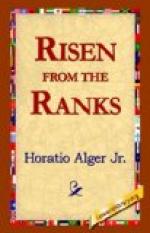in the shoe trade which threw him out of work.
More than most occupations the shoe business is liable
to these sudden fluctuations and suspensions, and
the most industrious and ambitious workman is often
compelled to spend in his enforced weeks of idleness
all that he had been able to save when employed, and
thus at the end of the year finds himself, through
no fault of his own, no better off than at the beginning.
Finding himself out of work, our hero visited other
shoe establishments in the hope of employment.
But his search was in vain. Chance in this emergency
made him acquainted with Professor Henderson, a well-known
magician and conjurer, whose custom it was to travel,
through the fall and winter, from town to town, giving
public exhibitions of his skill. He was in want
of an assistant, to sell tickets and help him generally,
and he offered the position to our hero, at a salary
of five dollars a week. It is needless to say
that the position was gladly accepted. It was
not the business that Harry preferred, but he reasoned
justly that it was honorable, and was far better than
remaining idle. He found Professor Henderson
as he called himself, a considerate and agreeable
employer, and as may be inferred from the conversation
with which this chapter begins, his services were very
satisfactory. At the close of the six months,
he had the satisfaction of paying the note which his
father had given, and so of disappointing the selfish
schemes of the grasping creditor.
This was not all. He met with an adventure while
travelling for the Professor, in which a highwayman
who undertook to rob him, came off second best, and
he was thus enabled to add fifty dollars to his savings.
His financial condition at the opening of the present
story has already been set forth.
Though I have necessarily omitted many interesting
details, to be found in “Bound to Rise,”
I have given the reader all the information required
to enable him to understand the narrative of Harry’s
subsequent fortunes.
CHAPTER 11.
The printing office.
Jotham Anderson, editor and publisher of the “Centreville
Gazette,” was sitting at his desk penning an
editorial paragraph, when the office door opened,
and Harry Walton entered.
“Good-morning, Mr. Anderson,” said our
hero, removing his hat.
“Good-morning, my friend. I believe you
have the advantage of me,” replied the editor.
Our hero was taken aback. It didn’t occur
to him that the engagement was a far less important
event to the publisher than to himself. He began
to be afraid that the place had not been kept open
for him.
“My name is Harry Walton,” he explained.
“I was travelling with Prof. Henderson
last winter, and called here to get some bills printed.”
“Oh yes, I remember you now. I agreed
to take you into the office,” said the editor,
to Harry’s great relief.




